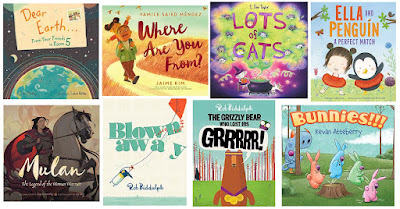Sharing summaries of two of the panelists this morning, see the Official Conference Blog for other panelists' summaries:
Tara Weikum,VP and Publisher of Storytide, an imprint of HarperCollins Publishers, has been at Harper for over 20 years. Her list focuses on middle-grade and teen fiction, and she is particularly drawn to stories with unexpected twists on a familiar premise; high-concept teen fiction; magical realism; and heartfelt middle grade with a unique point of view. Her list features authors such as Tahereh Mafi, Katherine Applegate, Lexi Ryan, Mackenzie Reed, Moira Buffini, and Jake Maia Arlow, among many others. Storytide brings together books that have both public and critical acclaim in the MG and YA categories. Tara's inspiration for her work came after college when she took a course on publishing and has been involved in the industry editing ever since. Book creators coming up with new stories continue to inspire Tara every day as an editor.
Saho Fujii is Executive Art Director at Little, Brown Books for Young Readers. Saho went to school to be a picturebook illustrator, but ended up getting a design job in publishing right out of college and has been designing for books ever since. She loved picture books as a kid and still does, and says she cannot stop herself from buying more beautiful picture books, Saho considers them as fine as any fine art painting. Growing up in Japan she loved American and European picturebooks and their windows into Western life and culture beyond her own country. Saho has designed for all categories in children's books but now focuses primarily on picturebooks and some of the creators she's worked with include Aaron Becker, Sophie Blackall, Bryan Collier, Christopher Denise, Michaela Goade, Grace Lin, LeUyen Pham, Jerry Pinkney, and Javaka Steptoe, among others.
What makes a great agent to Tara?
Tara has seen it all and can feel when an agent is 'checked out' or is not being a good advocate for their clients and that impacts if Tara as a publisher wants to continue working with them long term, and publishing is a small town. A great agent can help with issues that arise from either the publisher/editorial side or from the creative side, a good agent helps keep these various working relationships going during tough internal or external times.
How does Saho find new artists?
Saho goes to agency websites first, and does encourage unagented creators to get an agent and we are reminded that most publishing houses are closed to non-agented submissions. But for illustrators, there remains the option to send in postcards and Saho does like to receive postcards. She also looks to Instagram for illustration, as do her colleagues. She used to like to check out Etsy but it's so big now that it's a bit time consuming to be on there. A lot of agent's websites have great search engines and Saho considers that to be a huge help and timesaver. For short term project deadlines Saho turns to agents for their picks on artists who are available immediately or work fast.
Saho, when thinking about receiving very unique art samples in the past, like 3D models or beautifully printed calendars, or even just Express or Urgent mail... That is all unneccessary. One simple printed postcard with one big image on the front and maybe some spots on the back is enough. Saho puts favorite postcards up on her office wall.
















